Welcome to Bond Girl, a new series where we’ll be re-watching and re-evaluating every James Bond film until Spectre’s release. Check out previous entries here.
Contains: mentions of Nazis and human experimentation related to them as shown in the film’s canon.
It’s here at last, the final film in Roger Moore’s tenure as James Bond.
After seven films, I have to say that I’m going to miss Moore. To those of you who’ve marathoned the franchise and who have a soft spot for Sean Connery’s Bond: I know how you feel now. A View To A Kill is the seventh of Moore’s James Bond films and the fourteenth in the Eon production series over all. In A View To A Kill, Bond goes up against ex-KGB employee and billionaire Max Zorin in order to stop the man’s plans to destroy Silicon Valley and his competitors.
The thing about A View To A Kill though is that of all the Moore movies, it’s my ultimate problematic fave. There are parts of the film that I loved but at the heart of it there are some serious issues that I hated. The film is this glorious work of everything that’s good about the 80’s in film – but there’s also a lot of bad to contend with as well.
As much as I like this movie, there’s no getting around it: it’s just not a very good movie. The plot was a bit clunky and there were times that I either didn’t get or didn’t care about what was happening on screen outside of explosions and action sequences. Watching the film on repeat was the only way for me to realize that there were plot points that I was missing – that I had always missed – because the things I liked distracted me from everything else.
I like Christopher Walken as an actor.
Max Zorin though? Well he’s a horrible character. The fact that anyone anywhere thought of him as a “classic Bond villain” makes me shake my head. First of all, “classic Bond villain” isn’t exactly an aspiration. Some of the villains from Connery’s time as the character were just terrible.
Secondly, I think that’s giving Zorin more credit than he deserves.
He’s not a good villain.
Not by my (admittedly high) standards at least.
Zorin isn’t scary to me. I don’t find him compelling or interesting. Not only do I not understand even a percentage of his villainous motivation, but I found it hard to care. His backstory was… not the best and there’s a lot to unpack there that I’m not even sure that I can or even should unpack. I don’t even like the way that he treats his henchmen. There’s being evil and there’s being a huge jerk to the people that work for you and that’s kind of what Zorin does.
Out of all the villains we’ve had in Bond films so far, he’s mid-tier. Sure, he has this grand plan and a way of enacting it but when it all comes down to it, he’s average. If not for the fact that he was played by Christopher Walken, I probably wouldn’t even care enough about the character to write any of this.
I also have complicated feelings about Zorin’s backstory. Max Zorin was actually the result of Nazi medial experimentation during World War II. The project to create “super children” didn’t exactly go well since most of the attempts failed –either with the pregnancies ending badly or with the progeny winding up super smart but prone to using their intelligence poorly – but Zorin was a success.
I have thoughts about this backstory. Not only do we get this backstory delivered in a super casual way, but okay it’s like the first thing you know not to do as a writer. This is like fifty different levels of messed up, that not only do we introduce a villain that’s directly connected to things the Nazis have done, but it’s not a big deal.
You know what else isn’t a big deal?
The fact that one of the people who did the experimentation, one of the Nazi scientists, is wandering around free as a bird. There’s a lot that I didn’t remember about this movie and the complete and utter nonissue that is former Nazi scientist Hans Glaub running around the joint is definitely one of them.
Why this backstory?
Why?
I don’t even understand the choices that went into this part of the script-writing process. Was there no serious thought that went into this part of the plot? Seemingly small things like a villain’s backstory shouldn’t be so terrible. I shouldn’t have sat there staring at my screen as if I couldn’t believe what I was seeing. But seriously – this is the backstory they chose to go with for Zorin?
The combination of Zorin’s backstory and his personality was just not something I felt as if I could deal with.
Really, the only thing I liked about Zorin was his early relationship with Grace Jones’ May Day and his willingness to get his hands dirty.
Seriously, May Day stole the show for me.
There were so many good scenes that I can’t even pick just one to swoon over. One of the best though was a brief scene where she and Zorin were sparring and they wind up rolling around on the floor as an obvious precursor to foreplay. Their chemistry was amazing to witness and this is from someone that only seriously liked one of the two characters in the scene.
I didn’t even get how I was so into this scene because normally if I don’t like a character, I don’t like anything that they’re in. But it worked for me. It really worked for me.
Now I have thoughts about May Day as a character.
Somehow, May Day isn’t classified as a Bond Girl. On none of the lists I’ve seen is she even suggested for the position even though she’s you know… the best character in this movie even over James Bond himself.
There’s a part of my mind that is just fine with not classifying May Day as anything aside from a fierce and fantastic character but at the same time, I have complicated feelings about how she isn’t thought of as an official Bond girl. She saves the day, does a bit of seducing on her own, and sacrifices herself in the process. May Day doesn’t need to be a Bond Girl in order to be one of the best characters of the film.
I know this.
I get this.
That still doesn’t stop me from wishing (and wishing hard) that Grace Jones got more recognition for this role. Everything about her role as May Day was amazing, but I do have thoughts on her perception.
Technically, May Day falls under the category of “conquest” in the Bond franchise. I hate the fact that it’s a category for women in the first place because deciding that Bond has conquered anyone by having sex with them is so skeevy that it makes my skin crawl, but I really hate it here because it doesn’t fit.
May Day isn’t a conquest. Not in the slightest.
While she does have sex with James Bond, it’s absolutely on her terms. I know that it was definitely framed as a joke on his part, in the scene where May Day and Zorin go to May Day’s room only to find James Bond naked in her bed but okay – I love that scene. May Day is in charge for the whole of it. She walks in and drops her dress to the ground without any shame and Bond is both taken aback and intrigued by her boldness.
James Bond: I see you’re a woman of very few words.
May Day: What’s there to say?
If there’s any conquering going on in this scene, May Day is the one doing it. It’s hard to even consider anything else. She takes the lead, stalking towards her bed and Bond as if she’s on a hunter out for her prey. I feel as if May Day sees Bond as a conquest and not the other way around and that rather makes me wonder how she sees Zorin and how she views their relationship.
Sadly, we get next to no information on her character. Even the details of her relationship with Zorin are a mystery because we don’t see all of the ins and outs of it. She doesn’t even get that much dialogue. Like Jaws and Gobinda before her, May Day’s actions do the talking for her. While her gorgeously brutal fighting style and the way that she really doesn’t need to get chatty in order to get the point across. We know that she’s stronger than the average human and there’s an implication that she’s a product of some kind of experimentation herself, but we don’t get much more of that.
Now for the first time in a long time, I didn’t immediately cleave to the Bond Girl in one of these films. Tanya Roberts’ Stacey Sutton was not my favorite character in the film. I feel as if she could’ve been used differently in the story and that she doesn’t get to do enough. Maybe it was because of the way that I definitely over-identified with May Day, but I didn’t connect with Sutton.
Stacey Sutton is a good character. She’s fleshed out with a relatively interesting backstory and she’s really cute but she just didn’t click for me. I do know that part of that is because her relationship with Moore’s Bond was kind of squicky for me. As the actor playing Bond gets older, his Bond Girls (or at least the actresses that play them) get younger. The age range and the difference in her experience and Bond’s is something that I couldn’t get comfortable with despite trying.
In 1985, Roger Moore was fifty-six and it shows. It really shows.
Tanya Roberts? Well she was twenty-eight at the time that A View To A Kill was released.
That’s a significant age gap and trust me; you can’t help but notice it as you’re watching the film. Or at least, I couldn’t stop noticing it. While it isn’t the worst age gap or onscreen relationship James Bond has had in the franchise, I still couldn’t get behind it. I still couldn’t get behind Stacey Sutton.
I got so used to women in the Bond franchise like Anya Amasova and Octopussy that I adored instantly. For me, these women broke the mold of semi-stereotypical action movie heroines and other women in the Bond franchise. So I became attached to them and their type of characterization to a point where I couldn’t stop feeling as if Stacey Sutton was lacking something.
I always feel terrible when I don’t click with a Bond Girl. My definite love of May Day doesn’t excuse the fact that I’ve got plenty of biases to deal with and that cropped out of the woodwork with this movie. I’ve managed to excuse much worse in the past from these films and yet –
I know that there have been Bond girls that I didn’t take to or women in the franchise that I didn’t like or couldn’t stand the way that they were handled in the story, but I never feel okay about it. Especially like now when I find myself disliking a Bond girl for something not entirely related to her character.
On the bright side, I do have a few final positive things to say about the film.
In A View To A Kill, Moneypenny and some of the other MI6 higher-ups finally got to get out of the office. This film is Lois Maxwell’s final appearance as Moneypenny and I’m going to miss her. She really was a treat in the franchise and a desperately needed familiar face even though we didn’t get to see it that often.
Between her leaving the franchise and Roger Moore getting in his last film, I didn’t know how to feel. I didn’t really care that much about Connery. He’s everyone’s favorite Bond and I get it, but he didn’t always work for me. I didn’t like aspects of his portrayal of Bond and I didn’t like the way that his Bond interacted with women. More often than not, Connery’s Bond left me doing that awkward “I am uncomfortable, am I allowed to laugh” giggle during many of his scenes.
With Moore though, I’m actually going to miss watching his Bond films every week.
While his films weren’t perfect either (and there were some moments in some of his films like Live And Let Die that still make me angry to think about them, believe me), I didn’t start to dread his Bond. I didn’t feel as if I needed to take a serious break from him or sit down and watch something else after doing rewatches on end.
One of the things I mentioned when I was getting ready to start on Roger Moore’s run as Bond was how I couldn’t stop picturing elderly Roger Moore doing all of the stunts in his movies. Seven movies in and I’m over that. I genuinely enjoyed most of Moore’s portrayals of Bond. I tend to like him less than the women around him, but he was almost always the next most interesting character in the films. Moore’s delivery of his lines, the chemistry that he had with other characters, and the way that he even made the most ridiculous one-liners sound like they weren’t totally ridiculous were all things that went a long way towards my enjoyment of the films.
While Moore isn’t actually my favorite James Bond actor, he’s pretty darn close and I’m seriously going to miss his films.
Despite how grouchy this movie makes me (and believe me, I am aware of how much complaining I’ve done in this post), I really did like this movie. While the plot was lacking and I didn’t get behind several of the characters, I enjoyed the sight of so many familiar characters and Grace Jones is just… glorious in this film even if she does die a death I think was undeserved. Maybe there were a lot of parts in A View To A Kill that I didn’t like, but the parts that I did enjoy more than make up for those parts due to how fiercely I enjoyed them.
What I’m looking forward to:
How many times can I talk about how much I adore Timothy Dalton before it gets old? Wait. Don’t tell me. I’m just going to keep talking about him.
While I have to admit that my memories of his Bond films are faintly hazy, I’ve seen more than enough of Dalton’s body of film to remember that I just like seeing him onscreen. The Living Daylights is one of those Bond films that got me interested in history and politics and I’m looking forward to talking a bit more about both of those things.
Stitch writes about comics, nerd history, and ridiculous romance novels when not working frantically on her first collection of short stories. Find her on her blog or on Twitter.
—Please make note of The Mary Sue’s general comment policy.—
Do you follow The Mary Sue on Twitter, Facebook, Tumblr, Pinterest, & Google +?



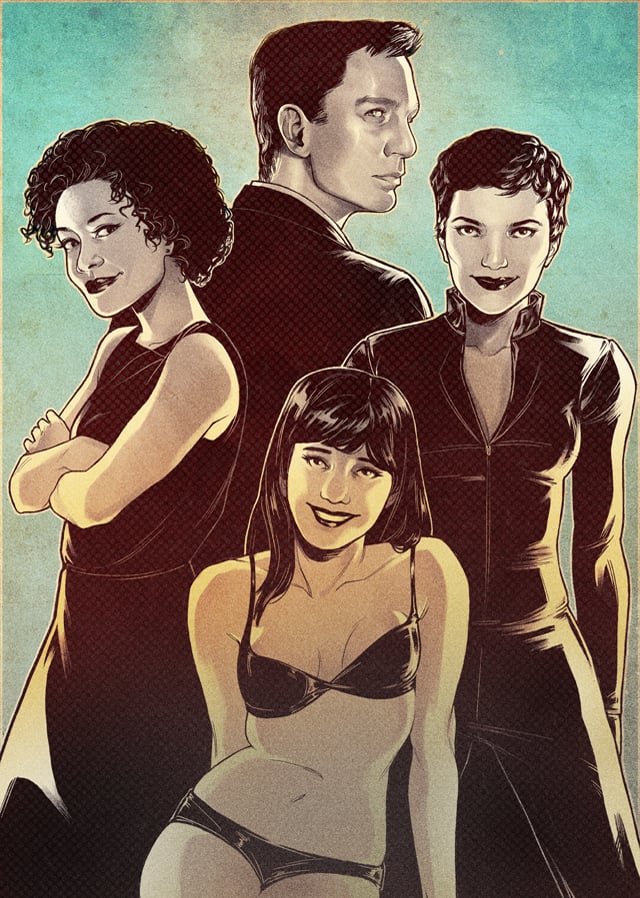
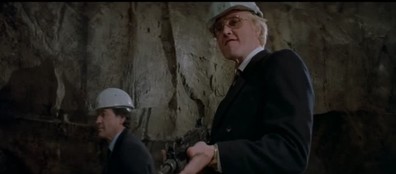
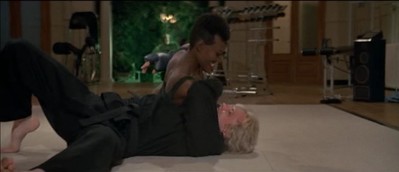
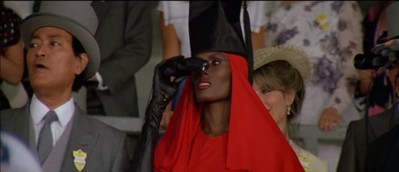
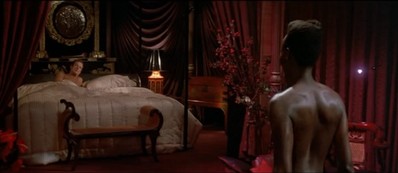

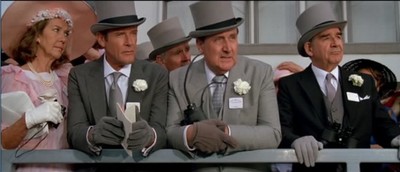





Published: Jul 20, 2015 02:49 pm